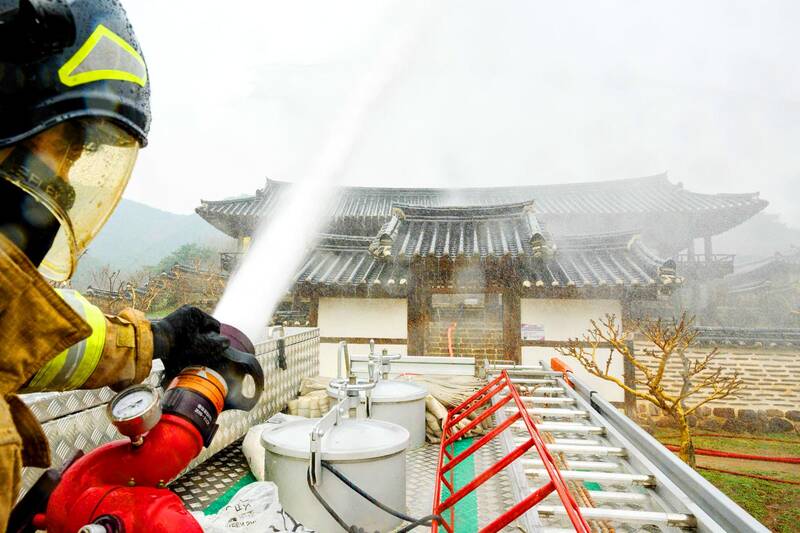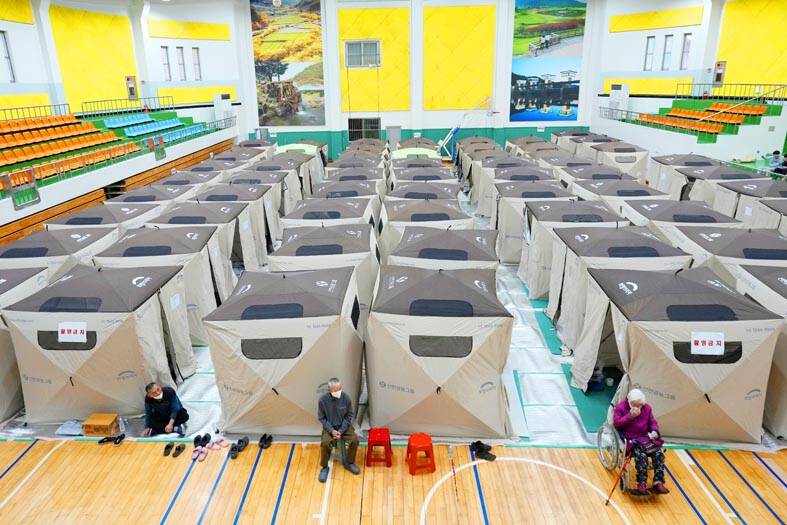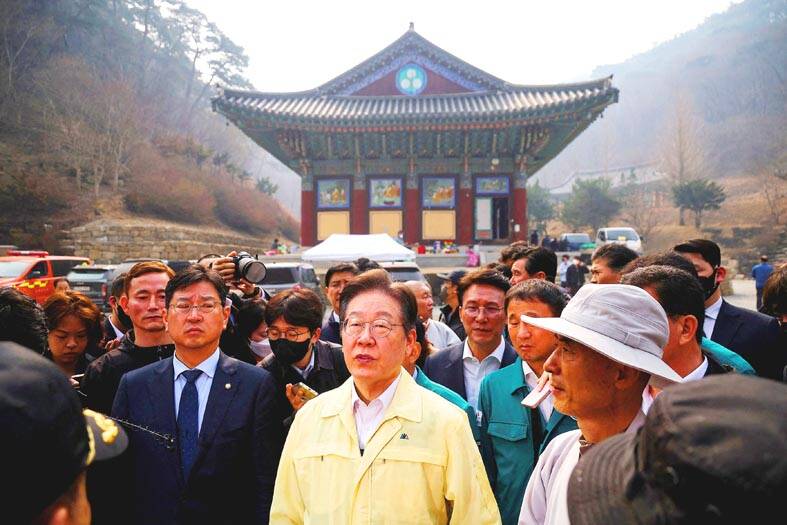Wildfires in South Korea are the largest and deadliest on record, having burned more forest and killed more people than any previous blaze, officials said yesterday, as the death toll reached 27.
More than a dozen fires broke out over the weekend, scorching wide swathes of the southeast and forcing about 37,000 people to flee, with the fire cutting off roads and downing communications lines as residents escaped in panic.
The South Korean Ministry of Interior and Safety said that 27 people had been killed and dozens more injured, with the toll likely to rise.

Photo: AFP
It is the highest number of deaths since the Korea Forest Service began records for wildfires in 1987.
More than 35,000 hectares of forest have been burned, Lee Han-kyung, disaster and safety division chief said, adding that the fire was still spreading “rapidly.”
The extent of damage makes it South Korea’s largest ever wildfire, after an inferno in April 2000 that scorched 23,913 hectares across the east coast.

Photo: AP
Authorities said changing wind patterns and dry weather had revealed the limitations of conventional firefighting methods.
Many of those killed were residents — in particularly elderly people.
At least three firefighters were killed, and a pilot in a firefighting helicopter died when his aircraft crashed in a mountain area, officials said.

Photo: REUTERS
Last year was South Korea’s hottest year on record, although temperatures in the months running up to the blaze had been colder than last year, and in line with the country’s 30-year average, Korea Meteorological Administration data showed.
However, the fire-hit region had been experiencing unusually dry weather with below-average precipitation, authorities said.
Some types of extreme weather have a well-established link with climate change, such as heat waves or heavy rainfall.
Other phenomena, such as forest fires, droughts, snowstorms and tropical storms can result from a combination of complex factors.
“This wildfire has once again exposed the harsh reality of a climate crisis unlike anything we’ve experienced before,” Lee said.
“The affected areas have seen only half the average rainfall, coupled with unusually strong winds, which have drastically accelerated the spread of the fire and intensified the damage,” he said.
Yeh Sang-wook, professor of climatology at Seoul’s Hanyang University, said that the lack of rainfall had dried out the land “creating favorable conditions for wildfires.”
“We can’t say that it’s only due to climate change, but climate change is directly [and] indirectly affecting the changes we are experiencing now. This is a sheer fact,” Yeh said.
However, another expert, Hong Suk-hwan at Pusan National University’s Department of Landscape Architecture, said the country’s forest management practices also took some blame.
South Korea has prioritized the preservation of large pine trees — packed with oily resin — above allowing a variety of deciduous trees to thrive, he said.
“If a fire breaks out, would it spread more easily on wet paper or dry paper soaked in oil? Our forests are essentially covered in oil-soaked paper, creating an environment where wildfires can spread at an alarming speed,” Hong said.
Were South Korea to have cultivated more deciduous trees in a natural mixed forest it “would slow wildfire spread and prevent it from escalating,” he added.
A 200-year-old pine tree at Bongjeongsa temple in Andong — the oldest wooden structure in South Korea and a UNESCO-listed site — was cut down in a bid to preserve the temple itself.
“We had no choice but to cut it down... The fire is spreading rapidly from one pine tree to another,” the chief monk said.
At UNESCO-listed Byeongsan Seowon, a former Confucian academy, the sky was hazy, with fire trucks spraying water and fire retardants onto the historic site in a desperate bid to save it.
“We are spraying three tonnes of water every day,” said Lee Seung-myung from the Andong fire department.
Choi Young-ho, a firefighter at the heritage site, said that they were at the mercy of the wind.
“If there is a strong wind, it will carry flames from afar — a very worrisome situation,” he said.
Rain was forecast for late yesterday, potentially giving authorities a much-needed window to extinguish the blazes.

DOUBLE-MURDER CASE: The officer told the dispatcher he would check the locations of the callers, but instead headed to a pizzeria, remaining there for about an hour A New Jersey officer has been charged with misconduct after prosecutors said he did not quickly respond to and properly investigate reports of a shooting that turned out to be a double murder, instead allegedly stopping at an ATM and pizzeria. Franklin Township Police Sergeant Kevin Bollaro was the on-duty officer on the evening of Aug. 1, when police received 911 calls reporting gunshots and screaming in Pittstown, about 96km from Manhattan in central New Jersey, Hunterdon County Prosecutor Renee Robeson’s office said. However, rather than responding immediately, prosecutors said GPS data and surveillance video showed Bollaro drove about 3km

‘MOTHER’ OF THAILAND: In her glamorous heyday in the 1960s, former Thai queen Sirikit mingled with US presidents and superstars such as Elvis Presley The year-long funeral ceremony of former Thai queen Sirikit started yesterday, with grieving royalists set to salute the procession bringing her body to lie in state at Bangkok’s Grand Palace. Members of the royal family are venerated in Thailand, treated by many as semi-divine figures, and lavished with glowing media coverage and gold-adorned portraits hanging in public spaces and private homes nationwide. Sirikit, the mother of Thai King Vajiralongkorn and widow of the nation’s longest-reigning monarch, died late on Friday at the age of 93. Black-and-white tributes to the royal matriarch are being beamed onto towering digital advertizing billboards, on

Tens of thousands of people on Saturday took to the streets of Spain’s eastern city of Valencia to mark the first anniversary of floods that killed 229 people and to denounce the handling of the disaster. Demonstrators, many carrying photos of the victims, called on regional government head Carlos Mazon to resign over what they said was the slow response to one of Europe’s deadliest natural disasters in decades. “People are still really angry,” said Rosa Cerros, a 42-year-old government worker who took part with her husband and two young daughters. “Why weren’t people evacuated? Its incomprehensible,” she said. Mazon’s

POWER ABUSE WORRY: Some people warned that the broad language of the treaty could lead to overreach by authorities and enable the repression of government critics Countries signed their first UN treaty targeting cybercrime in Hanoi yesterday, despite opposition from an unlikely band of tech companies and rights groups warning of expanded state surveillance. The new global legal framework aims to bolster international cooperation to fight digital crimes, from child pornography to transnational cyberscams and money laundering. More than 60 countries signed the declaration, which means it would go into force once ratified by those states. UN Secretary-General Antonio Guterres described the signing as an “important milestone,” and that it was “only the beginning.” “Every day, sophisticated scams destroy families, steal migrants and drain billions of dollars from our economy...